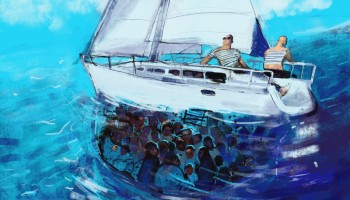The strategy package included proposals to allow European Union (EU) member states to deploy military force against human traffickers, seizing boats in countries such as Libya and even sending in ground troops.
But the divisive quota proposal, which would “share the burden” of migrants between member states by divvying them out, could prove the sticking point that sinks the whole raft of policies.
As recently as Tuesday morning, the European Commission had insisted that France was still supporting “a temporary relocation mechanism”, according to Politico Europe. But, later that day, French President François Hollande said there was “no question” of introducing the migrant quota system.
Spain had also suggested on Monday it would reject the scheme. Foreign minister José Manuel García-Margallo argued that taking in more people would be impossible given the country’s high unemployment rate.
With France and Spain signalling that they may reject the plan, a blocking minority in the European Council now seems possible. A group of member states representing 35 percent of the EU population is required to stall the plans.
A blocking minority would mean that the aggressive proposals to tackle organized smuggling networks, potentially through military force, could also be dropped. As OCCRP reported last week, the proposed seizure or destruction of boats likely to be used by smugglers and traffickers had required delicate negotiations, including approval by the UN Security Council.
The apparent failure of the proposals suggests that the political shift towards a more protectionist stance is continuing across the continent.
Jerome Fourquet of the IFOP opinion poll agency told Politico that the French administration’s withdrawal of support for the quota system was a reflection of public attitudes.
“They simply realized that accepting quotas was an unsellable position,” said Fourquet. “[Prime Minister Manuel Valls] knows that public opinion has turned against welcoming more migrants even on the left-wing and also wanted to send a message to Brussels.”
The tension between economic and humanitarian concerns was emphasized by Michael Diedring, secretary general of the European Council on Refugees and Exiles, who suggested that the quota system “seems to be mainly a statistical model that is convenient for member states but does not take the best interests of individuals into account.”






